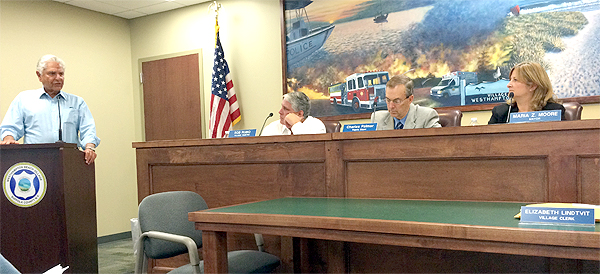Three speakers rose at the Westhampton Beach board meeting last night to castigate it for alleged stonewalling and inaction on the eruv issue. The board stuck to its “no comment” policy.
Arnold Sheiffer, chairman of Jewish People for the Betterment of WHB, who termed as “outrageous” a court decision June 30 declaring that lechi markers used for an eruv are not “signs,” pressed the board for details on how it is handling state and federal eruv-related cases.
Sheiffer argued in a letter in the July 30 Southampton Press that whether the lechi markers are “visible” or not on utility poles is irrevalent because they are highly visible on maps displayed on the websites of Synagogues including the Hampton Synagogue in WHB.
 Arnold Sheiffer, chairman of Jewish People for the Betterment of WHB; trustees Rob Rubio and Charles Palmer, Mayor Marie Moore Arnold Sheiffer, chairman of Jewish People for the Betterment of WHB; trustees Rob Rubio and Charles Palmer, Mayor Marie MoorePhotos: Debora Giammarco |
Local resident Charles Casano and this reporter also rose to press for details of the eruv litigation but were rebuffed by the five trustees and legal counsel Stephen Angel who told Mayor Moore and the other four trustees not to respond.
Board Said to “Hide Behind Lawyers”
Sheiffer charged board members with “hiding behind lawyers,” which they denied.
We told the board we have been trying to set up a meeting with any of them on the eruv since January without success. We were told that no such meeting is going to take place.
We then asked if any of the five trustees doubted former Mayor Conrad Teller’s opinion that “90-95%” of residents are against an eruv? No answers were received but the statement was not challenged. Sheiffer noted that new trustees Rob Rubio and Brian Tymann were elected with the support of his organization and asked that the pair lead in action on the eruv situation.
Tymann reiterated his view that religious symbols do not belong on utility poles on public WHB property.
Rationale for Silence Given
Thomas Moore, lawyer husband of Maria, who conducts the progress4web blog and who left the July 6 meeting when this reporter got up to speak, gave the rationale for avoiding comment on his website today.
Wrote Moore: “The Mayor explained that in theory, the Board of Trustees should be able to discuss publicly all matters of importance to the community. However, in practice, when it comes to litigation such public comments by elected officials too often end up being cited in the legal proceedings.
“Then counsel for the village has to spend a great deal of time and energy putting such comments into proper context. Just look at the complaints filed in federal court and you will find that it is the stray remarks of not only officials but of members of the community that constitute the body of the federal case, not any actions taken or threatened by the Board of Trustees.
“The Mayor did give a brief synopsis of the current status of the litigation for those who remained in attendance.”
Tom Moore Has a Point But…
Tom Moore, writing in behalf of WHB and his wife Maria, who is also a lawyer, has a point in that all sorts of remarks about a legal issue can end up in legal papers.
But that should not stop most of the discussion surrounding an issue like eruvim in the Hamptons which has cost WHB, Southampton, Quogue and Jewish People for the Betterment of WHB more than $1 million in legal fees thus far with no end in sight.
There is no law against discussing exactly what an eruv is. The public needs to know this. Orthodox legal filings stress that it allows pushing and carrying.
But when the Orthodox discuss this among themselves, such as in the six-month program hosted by Yale and Yeshiva Universities in 2012-13, the emphasis is on creating a “home,” a “private domain” and a religious enclave for believers.
Without an eruv, the devout will not move into an area. Some adherents say they are “in prison” without it. An eruv has deep religious meanings although this is denied and/or minimized in legal actions.
Casano Notes Changes in “Five Towns”
Resident Charles Casano said he is familiar with the changes that took place in the “Five Towns” of Long Island when ultra-Orthodox Jews became the majority in those towns.
Some public schools were closed because children of the Orthodox went to private schools, he said. The same thing would happen in WHB, he predicted, should the Orthodox make up the majority in the community.
This is not something that would happen in the current generation but it could be a concern of the children and grandchildren of current residents, he said.
Speir Calls for “Better Response” by Moore
Local blogger Dean Speir, a former WHB official, wrote today that the residents of WHB “absolutely deserve a better response from their Village board” on the eruv issue.
 Moore Moore |
Moore could not be heard and had to be told to speak closer to the microphone, he noted. “She glanced around at the other board members for help which was not forthcoming, so the essence of her response was, ‘We really can’t comment about ongoing litigation…’”
Speir termed this “Wrong answer!”
He called on Moore and Angel to “come up with a statement of some sort, at the very least outlining where the village is in the legal process.”
Last night’s meeting, attended by a dozen residents, none of whom spoke in defense of the board, was in sharp contrast to the July 6 meeting that was attended by more than 50, most of them apparently supporters of the Moore administration.
Our opinion is that Moore allies boycotted the meeting, knowing that the eruv would be brought up and that there would be speakers asking for information. A video of the meeting will be on the WHB website next week.
Law Against Fast-Food Outlets Amended
WHB, which has a law against “fast-food” outlets, amended its code to allow restaurants to have two cashiers. The previous law said that only one cashier was allowed per establishment.
The new law, while relaxed slightly, would still bar a McDonald’s, Burger King or Chipotle from opening in WHB.


 Husch Blackwell Strategies has added FleishmanHillard alum Michael Slatin as a principal in its public affairs group.
Husch Blackwell Strategies has added FleishmanHillard alum Michael Slatin as a principal in its public affairs group. Rory Cooper, a veteran Republican operative and policy specialist, has joined Teneo’s Washington office as senior managing director in its strategy & communications practice.
Rory Cooper, a veteran Republican operative and policy specialist, has joined Teneo’s Washington office as senior managing director in its strategy & communications practice. Brian Fallon, who served as national press secretary for Hillary Clinton’s 2016 presidential run, is signing on next month as Vice President’s Kamala Harris’ campaign communications director.
Brian Fallon, who served as national press secretary for Hillary Clinton’s 2016 presidential run, is signing on next month as Vice President’s Kamala Harris’ campaign communications director. TikTok is nothing more than a Chinese propaganda tool that poses “a grave threat to America’s national security and, in particular, impressionable children and young adults,” say two Congressmen who want the platform registered as a foreign agent.
TikTok is nothing more than a Chinese propaganda tool that poses “a grave threat to America’s national security and, in particular, impressionable children and young adults,” say two Congressmen who want the platform registered as a foreign agent. Public Strategies Washington has added Abbie Sorrendino, a former aide to now Senate Majority Leader Chuck Schumer.
Public Strategies Washington has added Abbie Sorrendino, a former aide to now Senate Majority Leader Chuck Schumer.


 Have a comment? Send it to
Have a comment? Send it to 
No comments have been submitted for this story yet.